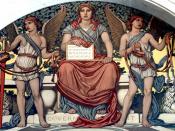Introduction
"Inflationary pressures have been present in our economic system for many years, and in fact in the economic systems of most of the world" (Mueller, 1998, p.246). "Most people think that inflation erodes the average purchasing power of income in the economy" (Hall and Lieberman, 2001, p.496). The consumer's response towards the pressures of inflation is inclined to vary depending on the fluctuation of the business cycle.
The major source of demand for goods and services produced are consumers. Consumer's response to inflation may be differ depending on if it is anticipated or unanticipated (Miller, 2001, p.159). "Thus they may step up their purchases in the face of rising prices or they may hold off and save more"(Mueller, 1998, p. 247).
Inflation is "the situation in which the average of all prices of goods and services in the economy is rising" (Miller, 2001, p.153). "When inflationary expectations are inaccurate, purchasing power is shifted between those obliged to make future payments and those waiting to be paid" (Hall and Lieberman, 2001, p.501).
When time is spent on resources in order to cope with inflation, an opportunity cost is paid. Inflation causes things to be more difficult and "forces sellers to use up resources" (Hall and Lieberman, 2001, p.502).
Fiscal Policy Slows Economic Growth
"A deliberate, discretionary change in government expenditures or taxes to achieve certain national economic goals is the realm of fiscal policy" (Miller, 2001, p.299). The federal government used fiscal policy, defined by the Keynesian analysis, in attempt to rid the economy of recessions and depressions. The fiscal policy does have tendencies to offset the economy such as an increase in government expenditures and induced interest rates (Miller, 2001, p.303). When an economic problem is recognized, policymakers must be apprehensive with time lags. These lag times are...


